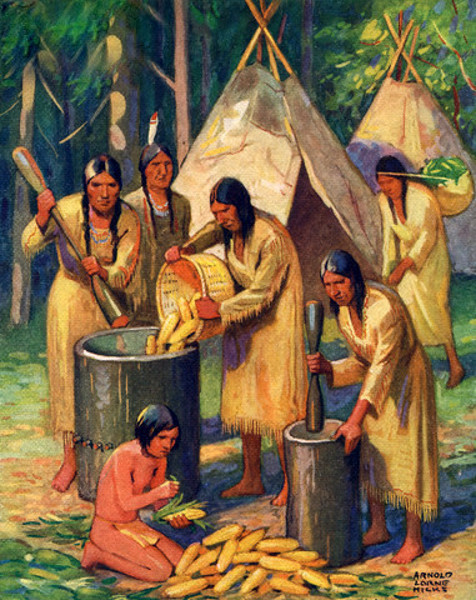
RED MEN CONVERTED.
BEFORE the English came to this country, there were no white persons living here. The whole land was occupied by wild and savage Indians.
These Indians were very numerous; they belonged to different tribes, and spoke different languages.
Some of them lived in light tents made of the bark of trees or the dried skins of animals, and others in huts made of clay. They obtained their living by hunting and fishing and raising a little corn. They were very warlike and revengeful, and when they captured any of their enemies, were accustomed to torture them in the most cruel manner, and then put them to death.
One object, which our forefathers had in view when they came to this country, was to enlighten these poor benighted heathen, and make known to them the way of salvation through the Redeemer.
As soon as they could learn their language, they commenced instructing them in the truths of the Bible. Some of the ministers became missionaries among the Indians, and were the means of inducing many of them to give up their savage customs, and become followers of the lowly Saviour. One of the first converted was a woman. She lived at Nowatum (now Newton), in Massachusetts, where Rev. John Elliot, one of the missionaries, was accustomed to hold meetings. At these meetings the Indians were allowed to ask questions of the missionary, on various religious subjects. The women were allowed to make inquiries through their husbands or an interpreter. This woman, at one of these meetings, and probably before her conversion, asked the following question, which shows both her ignorance and her thoughtfulness.
"When my husband prays," said she, "if I say nothing, and yet my heart goes along with what he says, do I pray?" That was an important question; how would you answer it?
This woman learned to spin, and became distinguished for her industry and the good management of her family. She loved her Maker, and was submissive to his will. She was finally attacked by a very painful disease, which resulted in her death. During her illness the missionary visited her and prayed with her. She said to him, "Me still love God, though he let me be sick; and me will pray to him as long as me live. Me be willing to die, and believe me will go to heaven at last and live happy with God and Christ there."
And so she died.
The Indians are very fond of figurative language. Here is an instance of the manner in which one of them showed his willingness to be a Christian. His name was Wannatancet. After listening to a sermon of Mr. Elliot's, whom he had heard preach many times before without believing, he said to the missionary: "You have been pleased in your abundant goodness, for four years past, to exhort me and my people with much persuasion to pray to God. I acknowledge that I have been used all my life to pass up and down in an old canoe; and now you wish me to make a change, to leave my old canoe and embark in a new one, to do which I have been unwilling. But now I give myself up to your advice, enter into a new canoe, and do engage myself to pray to God hereafter."
By his "old canoe" he meant his old heathenish religion, and by the "new canoe" he meant the Christian religion.
One of the company who was present asked Mr. Elliot to say to Wannatancet that while he went in his old canoe, though the stream was quiet, the end would be destruction; but now that he had embarked in the new canoe, though he might meet storms and rough passages, yet he must take courage, and persevere; for the end would be everlasting rest.